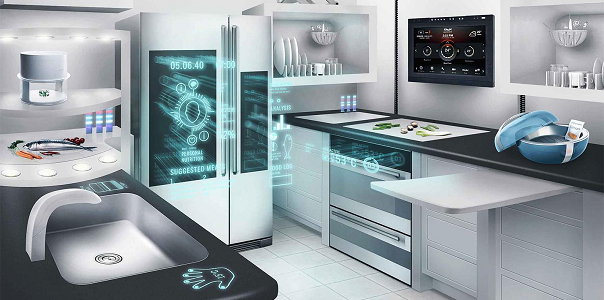As new technologies are being implemented across the sectors, the notion of IIoT is striding towards hospitality industry as well. For a chain of restaurants, with the growing number of outlets there is a strong need to network their operations to a central facility. From monitoring kitchen appliances to building management to delivery tracking, IIoT is the complete solution.
In the long term, the data from table-side ordering give deep insights on customer behavior and ordering pattern. Now even chefs can jump onto the IIoT bandwagon by switching on the fryers and oven from their iPhone, and more!!
Benefits of connected kitchen
Real-time Delivery Tracker – As consumers are becoming tech-savvy, time has come for the business to be on the leading edge. IIoT enables the customer to keep tracking their ordered food in real-time. This also improves staff efficiency by raising an alert when the delivery person takes a longer route or deviates from the destined path. In an industry where delivery time is crucial, faster and fresher food ensures a happy customer.
Optimizing Food Logistics – The IIoT solution also enables the managers to keep track of the inventory in transit. For instance, when a restaurant manufactures the confectionery in a separate outlet and it has to be distributed in all of its branches in a city. The Google-map based real-time visibility of the logistics eliminates driver negligence and improves efficiency by on time dispatch. Further, the quality of food is kept under check by monitoring the temperature of the truck in real-time.
Save on utility bills – Energy and water accounts for huge chunk of operating expenditure in a hospitality industry. IIoT solution enables restaurant to save on utility bills. Additionally, the health of an air conditioner, diesel generator, and other appliances (including refrigeration, kitchen display, oven, dish washers, and more) are monitored for predictive maintenance.
Streamlining Kitchen Operations – Food safety, compliance, and energy management are among key drivers for implementing IIoT devices and sensors. In most restaurants, health and safety regulations require consistent monitoring of the temperatures of ovens, deep fryers and refrigerators. That means an employee has to walk around the restaurant, sometimes up to three times a day, recording data manually. Sensors that automatically track and log temperature can save time, money and can reduce the margin of human error.
Increases food safety – In fact, the IIoT is already making real strides in maintaining a safe food supply. Smart kitchen sensors allow managers to be alerted, in real time, of individual equipment and performance issues that could compromise food safety. The data is also used to archive records of cooking temperatures and times. With the integration of IIoT platform, all kitchen equipment will work without using the traditional APIs, which should improve the freshness, availability, and reduce costs.
Remote monitoring with smartphones – The manager of a large portfolio of restaurants may remotely monitor ovens and other cooking equipment so that cooking efficiency is optimized and consistent product quality is maintained. Sensors mounted on each piece of equipment wirelessly send data to the cloud, where automated analysis is performed, generating alerts and recommendations which are transmitted to computers and mobile devices.
Connected Kitchen in action.
- Au Bon Pain, a US-based chain with international franchises, has piloted a system of sensors in several of its restaurants that monitors usage of kitchen appliances such as ovens, toasters, walk-in freezers and heating and cooling equipment.
- Luihn Food Systems, a Yum! Brands franchisee that operates over 75 restaurants uses a Quality Production Management (QPM) application that automates and streamlines food production.The application wirelessly networks each restaurant’s cooking appliances and provides real time remote monitoring and administration tools.
The real value of the IIoT is in intelligently using the large amounts of data gathered by sensors to respond quickly, in real time. Applications may remind operators when maintenance is required, let them know the correct procedures to take, and – ultimately – even order replacement parts or supplies automatically. Additionally, since food safety and product quality require constant vigilance, IIoT is a great vehicle for ensuring that these key factors are being addressed 24/7/365.
Are you looking to improve the efficiency of your food chain operation. Learn how Anglo African team can help you to implement an IIoT strategy for your hospitality needs. The Anglo African team is fully committed to helping you in achieving your industrial new vision to drive operations to the fullest potential. For specific queries, get in touch with Navin by calling on: 2331636 or via e-mail at navin.mautbar@infosystems.mu .

